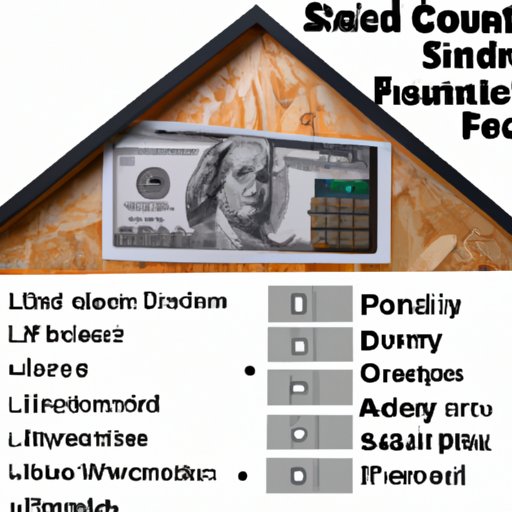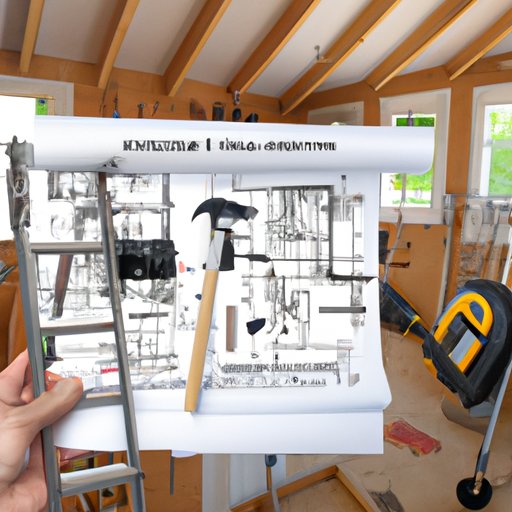Introduction
Adding on to your home is a great way to increase living space and improve the overall value of your property. But, before you start planning your dream addition, it’s important to understand what kind of investment you’re making. How much does a home addition cost?
The answer to this question can vary greatly depending on a number of factors, including size, location, quality of materials, labor costs, permits and fees, and financing options. In this article, we’ll provide a comprehensive guide to home addition costs, so you can make an informed decision about whether or not this is the right investment for you.
What is a Home Addition and Why Do People Consider It?
A home addition is a structure built onto an existing home to add extra living space. Common additions include bedrooms, bathrooms, sunrooms, garages, and decks. Homeowners may choose to add on to their homes for a variety of reasons, such as needing more space for an expanding family, wanting to update their home’s style or layout, or simply increasing the value of the property.
Overview of the Different Types of Home Additions
When it comes to adding on to your home, there are several different types of additions you can consider. Here’s a brief overview of some of the most common home addition projects:
- Room additions: Room additions are the most common type of home addition. This involves building a new room onto an existing structure, such as a bedroom, bathroom, or office.
- Garage additions: Garage additions are popular for homeowners who need extra storage space or want to add extra parking.
- Sunroom additions: Sunroom additions are a great way to add natural light and extra living space to your home.
- Deck additions: Deck additions are a great way to expand your outdoor living space and enjoy the outdoors.

A Comprehensive Guide to Home Addition Costs
Now that you have a better understanding of what a home addition is and why people consider them, let’s take a look at how much they typically cost. It’s important to remember that the cost of a home addition can vary greatly depending on a variety of factors, so it’s best to consult with a professional to get an accurate estimate.
What Factors Affect Home Addition Costs?
There are several factors that can impact the cost of a home addition project, including:
Size
The size of the addition is one of the biggest factors that will affect the cost. Generally speaking, larger additions will cost more than smaller ones.
Location
Where you live can also have an impact on the cost of a home addition. If you live in an area with a high cost of living, you can expect to pay more for labor and materials than if you lived in a more affordable area.
Quality of Materials
The quality of materials you choose for your home addition can also have an impact on the overall cost. Higher quality materials tend to be more expensive, but they can also last longer and add more value to your home.
Labor Costs
Labor costs can vary significantly depending on the type of work being done and the experience of the contractor. It’s important to research contractors and compare quotes to make sure you’re getting the best deal.
Permits and Fees
Depending on where you live, you may need to obtain permits and pay additional fees for your home addition project. These costs can vary significantly depending on the type of work being done, so it’s important to check with your local building department for more information.
Financing Options
If you don’t have the cash up front to pay for your home addition project, there are financing options available. Many banks and lenders offer home improvement loans, which can be used to cover the cost of a home addition project. Be sure to shop around and compare rates to find the best deal.
How to Create an Affordable Home Addition Budget
Once you have a better understanding of the factors that can affect the cost of a home addition project, the next step is to create an affordable budget. Here are a few tips to help you get started:
Set a Realistic Budget
Before you begin any home addition project, it’s important to set a realistic budget. Take into account all of the factors mentioned above, as well as any unexpected costs that may come up. Don’t forget to factor in the cost of furnishings and decorations for the new space.
Calculate All Costs
Once you have a budget in mind, it’s time to start calculating the actual costs of the project. This includes materials, labor, permits, fees, and any other costs associated with the project. Keep track of all of your expenses to make sure you stay within your budget.
Consider DIY Options
If you’re looking to save money on your home addition project, consider doing some of the work yourself. Depending on your skill level, you may be able to tackle certain aspects of the project, such as painting, tiling, or landscaping. Just make sure to do plenty of research before taking on any major projects.
Look for Ways to Save Money
When it comes to home improvement projects, there are always ways to save money. Look for sales on materials, shop around for contractors, and take advantage of tax credits and discounts. You may also want to consider hiring a general contractor to oversee the entire project, as this can often be more cost-effective.

Home Addition Cost Breakdown: What You Can Expect to Spend
Now that you have an idea of how much a home addition project can cost, let’s take a look at some of the specific expenses you can expect to incur. Keep in mind that these costs can vary depending on the size and scope of the project.
Common Home Addition Costs
- Foundation: The foundation is the base of the addition and is typically made of concrete. The cost of the foundation will depend on the size and complexity of the project.
- Framing: Framing is the process of constructing the walls and roof of the addition. The cost of framing will depend on the size and complexity of the project.
- Roofing: Roofing is the process of installing the roof of the addition. The cost of roofing will depend on the type of material used and the complexity of the project.
- Plumbing: Plumbing is the process of installing pipes and fixtures for water and sewage. The cost of plumbing will depend on the complexity of the project.
- Electrical: Electrical is the process of installing wiring and circuitry for lighting and appliances. The cost of electrical will depend on the complexity of the project.
- HVAC: HVAC is the process of installing heating, ventilation, and air conditioning systems. The cost of HVAC will depend on the type of system installed and the complexity of the project.
- Insulation: Insulation is the process of installing insulation to keep the addition warm in the winter and cool in the summer. The cost of insulation will depend on the type of material used and the complexity of the project.
- Drywall: Drywall is the process of installing drywall to finish the interior walls of the addition. The cost of drywall will depend on the type of material used and the complexity of the project.
- Flooring: Flooring is the process of installing flooring in the addition. The cost of flooring will depend on the type of material used and the complexity of the project.
- Windows and Doors: Windows and doors are an important part of any home addition. The cost of windows and doors will depend on the type of material used and the complexity of the project.
- Cabinetry and Countertops: Cabinetry and countertops are an important part of any kitchen or bathroom addition. The cost of cabinetry and countertops will depend on the type of material used and the complexity of the project.
- Painting: Painting is the process of painting the interior and exterior of the addition. The cost of painting will depend on the type of material used and the complexity of the project.
- Appliances: Appliances are an important part of any kitchen or bathroom addition. The cost of appliances will depend on the type of appliance purchased and the complexity of the project.
- Landscaping: Landscaping is the process of planting trees and shrubs around the addition. The cost of landscaping will depend on the type of plants used and the complexity of the project.

Get the Most Value from Your Home Addition Project
Now that you have a better understanding of the costs associated with a home addition project, it’s time to start thinking about how to get the most value out of your investment. Here are a few tips to help you get the most out of your home addition project:
Choose Quality Materials
When it comes to home improvement projects, it’s important to choose quality materials that will last for years to come. While higher quality materials can be more expensive, they can also add more value to your home in the long run.
Hire Experienced Contractors
It’s important to hire experienced contractors who know what they’re doing. Make sure to do your research and read reviews before hiring anyone to work on your home addition project.
Research Local Regulations
Before beginning any home addition project, it’s important to research local regulations and make sure you’re compliant with all laws and building codes. This will help ensure that your project meets all necessary safety standards.
Prepare for Unexpected Expenses
No matter how well you plan your home addition project, there’s always a chance that unexpected expenses can pop up. It’s important to budget for these unexpected expenses to make sure you don’t go over your budget.
How to Save Money on Your Home Addition Costs
In addition to getting the most value out of your home addition project, there are also several ways to save money on the costs. Here are a few tips to help you save money on your home addition project:
Shop Around for Materials
Materials can make up a large portion of the cost of a home addition project. To save money, it’s important to shop around for the best prices on materials. Look for sales and compare prices to make sure you’re getting the best deal.
Reuse Existing Materials
If you’re renovating an existing structure, you may be able to reuse some of the materials. Reusing materials can help you save money on the cost of the project.
Compare Multiple Contractors
It’s important to compare multiple contractors before hiring anyone to work on your home addition project. Get quotes from several contractors and compare prices to make sure you’re getting the best deal.
Consider Doing Some Work Yourself
If you’re comfortable doing some of the work yourself, you may be able to save money on the cost of the project. Just make sure to do plenty of research before taking on any major projects.
Take Advantage of Tax Credits
Many states offer tax credits for energy-efficient home improvements. If your home addition project qualifies, you may be able to take advantage of these tax credits and save money on the cost of the project.
Seek Out Discounts
Finally, it’s important to look for discounts and special offers when shopping for materials and hiring contractors. Many stores and contractors offer discounts for seniors, veterans, and other groups, so be sure to ask about any available discounts.
Conclusion
Home additions are a great way to increase living space and add value to your home. However, it’s important to understand the costs associated with a home addition project before you begin. The cost of a home addition can vary greatly depending on a number of factors, including size, location, quality of materials, labor costs, permits and fees, and financing options. By doing your research and budgeting carefully, you can get the most value out of your home addition project.
To save money on your home addition project, it’s important to shop around for materials, compare multiple contractors, consider doing some work yourself, take advantage of tax credits, and seek out discounts. With careful planning and preparation, you can make your home addition project a success.
(Note: Is this article not meeting your expectations? Do you have knowledge or insights to share? Unlock new opportunities and expand your reach by joining our authors team. Click Registration to join us and share your expertise with our readers.)
